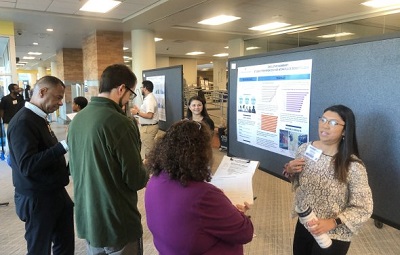Description/Abstract/Artist Statement
Throughout all stages of processing, most juveniles who encounter the justice system demonstrate cognitive-communicative difficulties (CCDs). Empirical evidence reveals that 19-22% of female and 28-38% of male youth offenders, culminating in approximately 50-60% of youth offenders, demonstrate language disorders that require intervention, but most have never received services (Snow et al., 2014; Winstanley et al., 2021). Speech-language pathologists (SLPs) are communication experts certified to assess and treat CCDs. While nations abroad recognize the value of SLP involvement in all stages of processing for justice-involved youth (JIY), America lags in utilizing SLPs to improve JIY outcomes and lower youth's risk of recidivism. We will summarize and present international models of SLP intervention for consideration and application in the American juvenile justice system.
Faculty Advisor/Mentor
Anne Marie Perrotti
Faculty Advisor/Mentor Department
Human Movement Sciences
College Affiliation
College of Education & Professional Studies (Darden)
Presentation Type
Poster
Disciplines
Cognitive Science | Criminal Law | Criminal Procedure | Criminology | Criminology and Criminal Justice | Disability Studies | Educational Assessment, Evaluation, and Research | Education Law | Juvenile Law | Other Teacher Education and Professional Development | Prison Education and Reentry | Social Justice | Special Education and Teaching | Speech Pathology and Audiology
Session Title
Poster Session
Location
Learning Commons Lobby @ Perry Library
Start Date
3-30-2024 8:30 AM
End Date
3-30-2024 10:00 AM
Upload File
wf_yes
Included in
Cognitive Science Commons, Criminal Law Commons, Criminal Procedure Commons, Criminology Commons, Criminology and Criminal Justice Commons, Disability Studies Commons, Educational Assessment, Evaluation, and Research Commons, Education Law Commons, Juvenile Law Commons, Other Teacher Education and Professional Development Commons, Prison Education and Reentry Commons, Social Justice Commons, Special Education and Teaching Commons, Speech Pathology and Audiology Commons
Global Strategies for Addressing Communication Disorders in Justice-Involved Youth
Learning Commons Lobby @ Perry Library
Throughout all stages of processing, most juveniles who encounter the justice system demonstrate cognitive-communicative difficulties (CCDs). Empirical evidence reveals that 19-22% of female and 28-38% of male youth offenders, culminating in approximately 50-60% of youth offenders, demonstrate language disorders that require intervention, but most have never received services (Snow et al., 2014; Winstanley et al., 2021). Speech-language pathologists (SLPs) are communication experts certified to assess and treat CCDs. While nations abroad recognize the value of SLP involvement in all stages of processing for justice-involved youth (JIY), America lags in utilizing SLPs to improve JIY outcomes and lower youth's risk of recidivism. We will summarize and present international models of SLP intervention for consideration and application in the American juvenile justice system.


